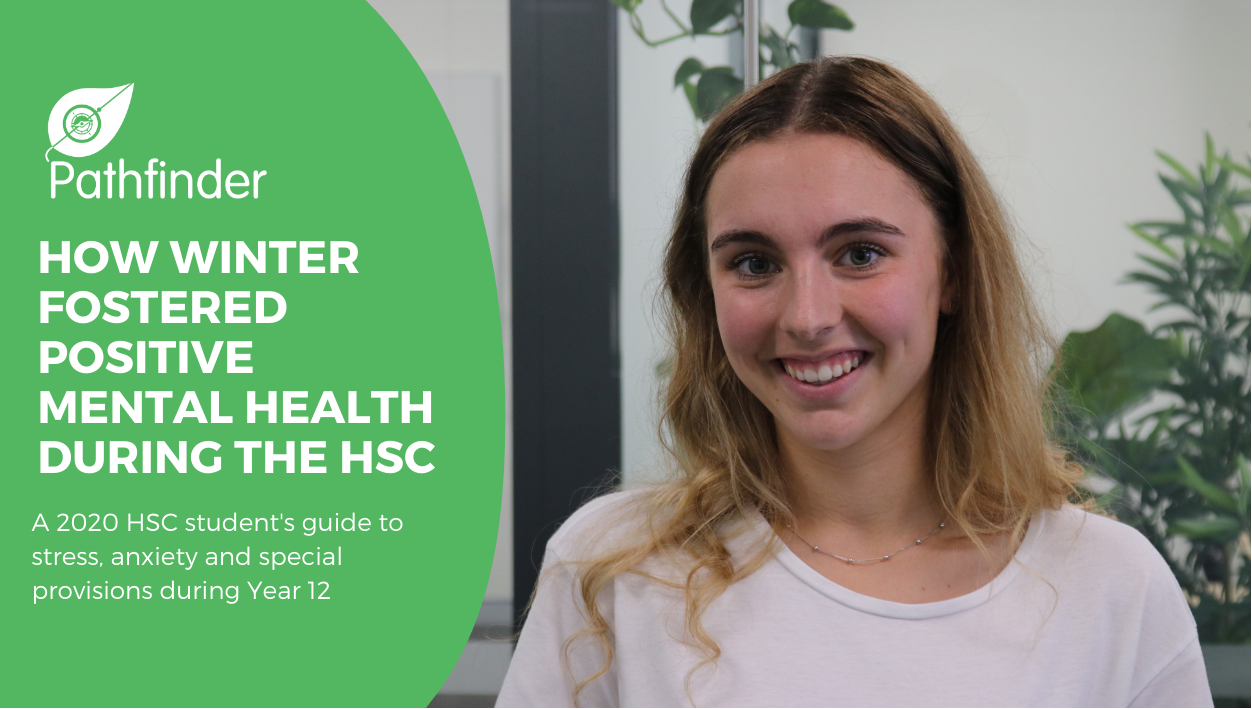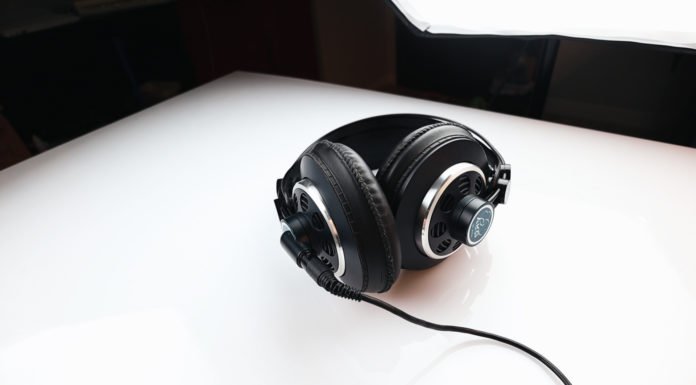Maintaining good mental health during the HSC is one of those unsaid factors that is so important not only for a students success but also their overall wellbeing.
This has proved an even more prominent issue in 2020, as an Art of Smart research report found that 3 in 5 students believed their mental health had been negatively affected by COVID-19 and remote learning.
Pathfinder Alumni Winter was one of these students, but by the end of the HSC, she was able to develop some awesome strategies to succeed in Year 12!
We interviewed her to find out her 6 top tips for promoting positive mental health during one of the most stressful times of your life. Read on to find out…
Tip #1: How to Manage Your Time in a Healthy Way
Tip #2: Talk to Someone
Tip #3: Put Your Problems on Paper
Tip #4: Exam Advice
Tip #5: Get Special Provisions
Tip #6: Final Advice
- Winter attended Marion Catholic College in Griffith
- Her primary hobby is dancing, from ballet to jazz and tap to contemporary
- She plans to study a Bachelor of Sports Exercise Science and a Bachelor of Nutrition at University
The Problem
“I went through a really bad stage with mental health and anxiety during the HSC. I was scared about the unknown with exams, and I had all of this pressure and fear of failing because I felt like I was letting everyone down if I didn’t live up to my own standards.”
Winter just wasn’t in the right headspace, and this had a subsequent negative impact on her marks.
Through the Pathfinder program and reaching out for help, she was able to develop a range of techniques to manage her mental health and anxiety throughout the HSC
“My Pathfinder mentor Sarah was like that little angel on my shoulder. She was that bit of motivation and a constant reminder that I could do this. I also got support in regards to time management. I’m sure that a lot of people who have done the Pathfinder Program would agree that this really helps for anxiety.”
So what did exactly she learn?
Tip #1: How to Manage Your Time in a Healthy Way
Winter had a variety of different commitments throughout the HSC. This led to a jam-packed schedule, and if your time isn’t managed properly, this can result in great amounts of stress.
“Sarah helped me in regards to time management. Because she had been through the HSC before, she really knew what works if you want to find the right balance.”
The key advice Sarah gave Winter that is applicable to all students is to put aside some time for yourself among all of your different tasks.
In the case of Winter, this meant taking a second to think about what she really enjoys doing and allocating a specific section of her timetable to it. Whether it was dancing or taking the dog for a run, she would designate a spot to self-fulfilment.
“Not only did this mean that I always had time to make sure I was mentally healthy it also meant that when I did study it wasn’t just a full session of procratination.”
In the past, Winter would just sit there and look at the clock during her study sessions. However, the knowledge that she had time to do what she loved gave her a boost of motivation to complete the school tasks at hand.
“After doing this I saw the results in my marks. Without Sarah I wouldn’t have had any guidance on what works and what doesn’t for time management.”
Remember, never be afraid to talk to older students or mentors about what techniques they implemented to manage their time. The HSC is a unique experience, and often you can learn from the wins or mistakes of those who have completed it most recently!
Tip #2 – Talk to Someone
When it came to Winter’s mental health talking to her parents was a great benefit.
“I knew I hated everything that was going on in my brain but my parents helped me take the first step to get help.”
From here her mentor Sarah recommended talking to a counsellor as someone to vent to.
“The counsellor then pointed me in the direction of a psychologist, and I learnt strategies that are applicable to not only school but also life.”
Tip #3 – Put Your Problems on Paper
As Winter’s struggles with mental health were often linked to the high standards she set for herself, she would often get upset when her plans didn’t come to fruition.
To combat this, she implemented a quick yet super effective mindfulness strategy:
- Write down exactly what went wrong throughout the day on a piece of paper.
- What was the initial plan you had? What didn’t go to plan?
- Write about how you were feeling after this. Why did it make you feel this way?
Now while this seems simple, it’s a great way to reflect on your emotions. There’s something about putting your thoughts onto paper that really enhances perspective.
“It made me realise that things really weren’t as bad as they could be. Yes, things didn’t happen as I would have liked but that’s just life.”
“It also helped me see the patterns in my behaviour and responses. I could gage the recurring triggers that were upsetting me or causing anxiety. It was through this approach that I came to realise that exams were a massive trigger and as a result I could bring this to my mentor or support network to work out specific coping techniques.”
Exam stress is a major problem that a lot of students face especially with the high-pressure environment of the HSC. So what advice does Winter have for other students?
Tip #4: Exam Advice
Stimulate Your Senses:
One thing Winter did to reduce anxiety during exams was an awareness technique.
Because HSC examinations are such a foreign environment that students have never been in before it can be a good idea to take a second to focus on your surroundings.
It’s simple, just take note of what you can:
- See
- Hear
- Feel
Take your mind out of the paper and connect to reality for a second.
“This really helps to take your mind off built-up thoughts or pre-conceived notions about the exam that can increase stress.”
When you have all these fears and expectations this is a great technique for letting your mind re-ground itself.
Listen to Music
One specific thing that calmed Winter in exams was listening to music.
The experts back this as research has found that music can be a great tool for reducing pain in people who have high levels of anxiety.
But wait, since when were you allowed to listen to music during exams???
It’s through something called special provisions.
Tip #5: Get Special Provisions
So what are special provisions?
“I was really in the dark at the start of Year 12 to be honest. I had heard about it but had no clue how to get them. Luckily Sarah could guide me becasue she had been through the HSC and could take me through the steps.”
Winter applied for provisions and was allowed to listen to music and take rest breaks. You can actually get a scribe to write for you if you need but by the HSC Winter believed that she’d developed enough strategies to deal with her anxiety without one.
“I would totally recommend special provisions. If you think that you need them, get them. They’re there to be used and can really level the playing field for people who suffer from anxiety.”
Are you in need of special provisions? Talk to a teacher or find out how to get provisions or other considerations in this article.
Tip #6: Final Advice
Winter’s final advice for students suffering from anxiety or poor mental health in the HSC is to remember you’re not alone.
“So many people think that others are going to judge them and there’s nothing out there to help. There have been times when I couldn’t see the light at the end of the tunnel but there are so many support networks you can use. All you have to do is reach out.”
Struggling with anxiety in the HSC?
In the Pathfinder Program we’ll help you balance all your co-curriculars and study so you can stay healthy during Years 12 and avoid burning out! Get a mentor like Winter’s to help you develop a personalised study plan in The Pathfinder Program!
Learn more or get started with an inspirational Pathfinder Mentor and get in touch today!
Give us a ring on 1300 267 888, email us at [email protected] or check us out on Facebook!





